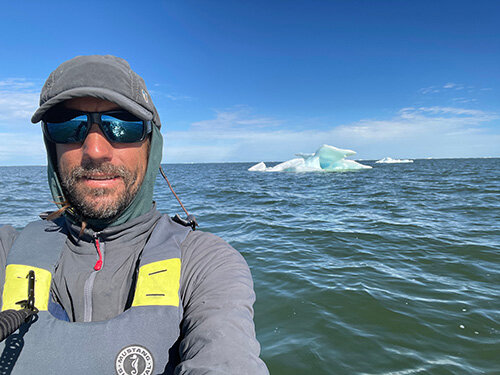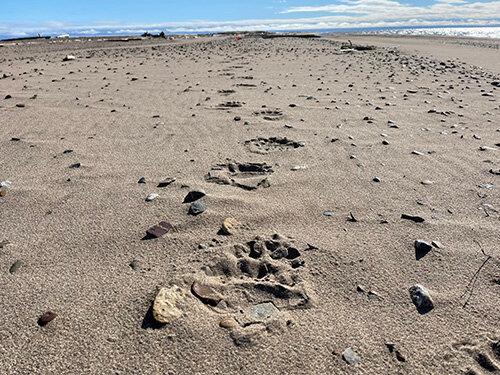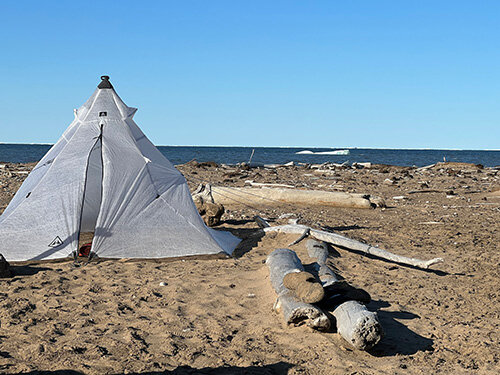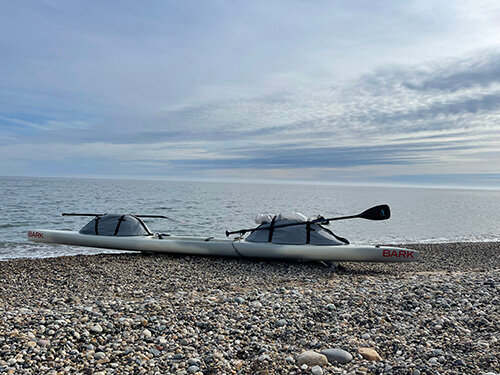 Karl Krüger takes a selfie in front of an iceberg in the Arctic. Karl Krüger photo
Karl Krüger takes a selfie in front of an iceberg in the Arctic. Karl Krüger photoLast summer, Karl Krüger sat in Paulatuk at ease.
Krüger had set off from Tuktoyaktuk, bound for Pond Inlet, Nunavut, just over two weeks earlier. Tuktoyaktuk and Paulatuk are oceanside hamlets in the Inuvik region of Canada’s Northwest Territories. Less than 300 people live in Paulatuk, and under 900 in Tuktoyaktuk. Krüger hadn’t seen another person in 15 days. He had paddled the 420 miles of coastline and crossings between the two villages on his custom BARK Expedition stand up paddleboard (SUP). And while he stopped in Paulatuk, short of his nearly 2,000-mile goal, he was aware his time in the Arctic wasn’t over.
 Karl Krüger photo
Karl Krüger photoKrüger set his sight on the Northwest Passage in 2017, while he was crossing the Dixon Entrance on the second last day of his unsupported, 14-day Race to Alaska (R2AK) paddle. The next day he would become the first person to finish the 750-mile race from Port Townsend to Ketchikan, Alaska on a SUP. But at the time, Krüger said he was hungry for more. He wanted more of the solitude the journey had brought him.
“That deeper connectivity with place, on a spiritual level,” he said.
Krüger began thinking about the Arctic. He said he struggles to find the words to convey its appeal. He said he’s been reading about the Northwest Passage his whole life and that Barry Lopez’s “Arctic Dreams” is the closest thing to his own thoughts. Sometimes, he said, he falls asleep listening to the audiobook, read by the late author and naturalist.
Once in his life a man ought to concentrate his mind upon the remembered earth. He ought to give himself up to a particular landscape in his experience; to look at it from as many angles as he can, to wonder upon it, to dwell upon it. He ought to imagine that he touches it with his hands at every season and listens to the sounds that are made upon it. He ought to imagine the creatures there and all the faintest motions of the wind. He ought to recollect the glare of the moon and the colors of the dawn and dusk.
~ “The Way to Rainy Mountain” by N. Scott Momaday, Lopez’s motto for “Arctic Dreams”
Krüger grew up in New York’s Adirondack Mountains. His half-Algonquin, abusive father, a hunting and fishing guide, taught him paddling and introduced him to spending long stints in nature. Krüger left home at 15. He moved to California to teach windsurfing after graduating high school. Then he made his way north and received an environmental science degree from Western Washington University.
 Karl Krüger photo
Karl Krüger photoNow, he lives on Orcas Island and runs his own sailing charter business, Krüger Sea, on his 64-foot steel cutter Ocean Watch. He has led expeditions in the San Juan Islands, Canadian Gulf Islands, British Columbia coast and Alaska for over 20 years.
Krüger made plans to launch his Northwest Passage attempt in summer 2019, but backed out and used the trip to scout his route. The Covid-19 pandemic delayed his travel plans to 2022, when he set out from Tuktoyaktuk to paddle the 1,900 miles to Pond Inlet in two months. He cut his trip short, stopping in Paulatuk.
After a few days in Paulatuk, Krüger found a place to leave his board for the winter and flew out, with the intention of coming back the following summer to paddle another stretch of the way. He said he underestimated the scale of his undertaking and had to adjust the timeframe of his passage. Over the 420 miles and 15 days, he lost 17 pounds and survived on rations of water for multiple days. His pack totaled nearly 400 pounds including the weight of his board. But he said the mental challenges eclipse the physical ones.
 Karl Krüger photo
Karl Krüger photo“The only way to navigate in the Arctic — and that is times by about 1,000 if you're traveling solo — is to do it in a way that is aligned,” Krüger said. “Where you're not fighting against all the forces, and all the risks, and yourself, it is to simply be in open communication with the ancestors, and with the spirit in place.”
Last year, Krüger said getting off the beach is the true test, and he said that still holds true. All his relationships have been tested. The trips have burdened him financially. But he said he still wants to see this one through to the end. He said failure is an option, and if that is the case, he would still be happy, knowing he’s grown enormously.
“We have this notion in this modern life, that we have some control over our lives,” Krüger said. “And when you step off the beach into a place like that, what you're running into directly, is the fact that we have no control over anything.”
Krüger plans to head back to Paulatuk in July to paddle 450 miles to Kugluktuk in Nunavut territory. His current plans are to finish the 1,900 miles by 2026. This summer, he said if he’s up for it and the weather cooperates he may continue another 450 miles to Gjoa Haven. x